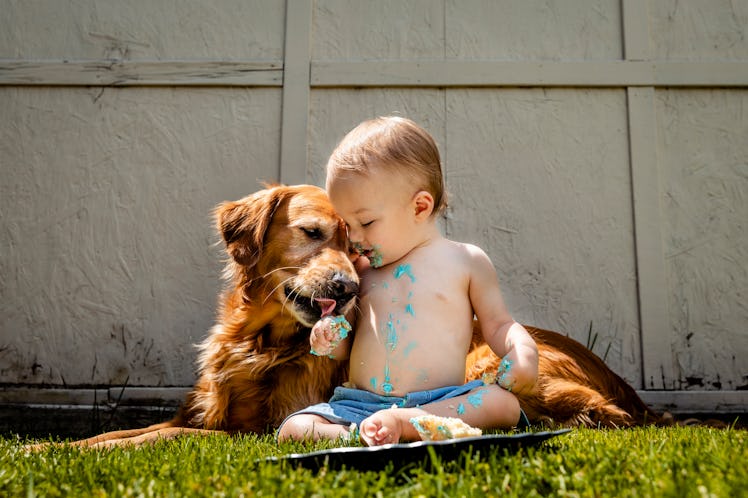Toddlers And Dogs Have An Undeniable Connection, Study Finds
A new study finds that toddlers will help dogs get toys and treats, even without prompting.

Kids and dogs make an unbeatable team. From snarfing up the crumbs under the highchair or receiving hastily sneaked food from the tray, kids look out for their pups. Dogs make excellent pillows and dress-up partners, and kids give dogs food, love, and belly scritches, making for great friendships and partnerships.
But a new study shows just how deep that partnership goes. According to research recently published in the journal Human-Animal Interactions, toddlers may have an instinctive drive to help out their four-legged friends.
A team of researchers from the University of Michigan observed children between ages 1 and 3 as they were exposed to one of three friendly pet dogs: Henry, Fiona, and Seymour. The dogs were placed in a commercially available baby gate enclosure in the same room as the child and a parent, who was there only to observe. A toy or food item was placed within the dog’s line of sight but out of its reach.
Dog ‘experimenters’ Fiona (left), Henry (center) and Seymour (right).
In half the trials, the toddler gave the item to the dog if the dog showed interest in the item by whining, pawing at the enclosure, or making that face that dogs make when they want something, which suggests that toddlers understand the dog’s goal and want to provide an assist in achieving that goal. In instances where the dog was not interested in the item, toddlers still gave the dog the item 26% of the time, suggesting that toddlers just really love giving stuff to dogs.
Children who had dogs in the home were more likely to help the dogs achieve their goals than children without dogs; children without dogs chose to help in 40% of the scenarios, compared to 60% for kids who lived with dogs.
“Previous studies have shown children, even at really young ages, want to behave in ways that are helpful to people,” explained study author Rachna Reddy, Ph.D. “Now we know they have a similar instinct to do this for dogs.”
“We have lived alongside dogs for thousands of years, so we have a special history with them, which may help to explain this,” Reddy added.
Mounds of previous research show the benefits, both physical and emotional, of growing up with pets, specifically dogs. Kids with dogs are less likely to have allergies and may have increased immune function due to a wider variety of healthy gut bacteria. Kids with dogs also develop a heightened sense of empathy and greater self-esteem.
The study period was cut short due to the spread of the COVID-19 pandemic, so researchers were only able to collect data on 23 children before the project ended. The research team notes that more study is needed to determine if the results are repeatable across a wider demographic of children (and dogs).
This article was originally published on